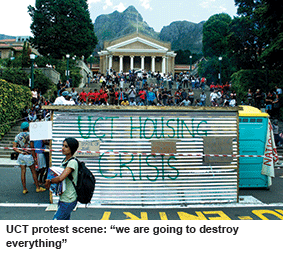 First they came for the statues. Last year students in Cape Town sparked national protests by calling on the University of Cape Town (UCT) to remove a statue of Cecil Rhodes, a Victorian imperialist who, like most Englishmen of his time, held racist views. The statue was removed but students were still angry. Many marched on South Africa’s parliament to complain about high college fees, among other things. That prompted a cash-strapped government not to raise fees after all.
First they came for the statues. Last year students in Cape Town sparked national protests by calling on the University of Cape Town (UCT) to remove a statue of Cecil Rhodes, a Victorian imperialist who, like most Englishmen of his time, held racist views. The statue was removed but students were still angry. Many marched on South Africa’s parliament to complain about high college fees, among other things. That prompted a cash-strapped government not to raise fees after all.
Protests about statues of dead racists soon spread worldwide. Students demanded that Oriel College, Oxford take down its statue of Rhodes. (It refused.) The University of Texas at Austin has moved a bronze of Jefferson Davis, the Confederacy’s president, and will place it in a museum.
Meanwhile, back in Cape Town, UCT students starting a new academic year after the long summer break were quick to resume protests, this time over gripes such as not having enough spaces in university dormitories. They stormed through the campus grabbing artworks and burning them. Most paintings they heaped on a bonfire were portraits of white historical figures. They were, declared one protester, “symbols of the coloniser”.
Another protester proudly posted pictures of the bonfire on Twitter, showing flames licking at the edges of a plaque commemorating Jan Smuts, a British-educated general who was twice South Africa’s prime minister and helped write the preamble to the UN’s founding charter. The tweet accompanying it proclaimed: “Whiteness is burning”.
In UCT, some students recently started a shisa nyama, grilling sausages and chops over charcoal. The flames spread. The small band of students refused to remove the shack, which university officials said was blocking traffic, and went on a rampage. They burned a car, a bus and the office of Max Price, the university’s vice chancellor. “It is utterly regrettable that a movement that began with such promise and purport to be fighting for social justice matters has now deteriorated into a group that engages in criminality,” says Price.
Little seems left of the lofty aims that prompted students to take to the streets last October, when they garnered widespread support for their argument that high tuition fees put university education out of reach for black students from poor families. The shortage of housing at UCT is partly due to the success of those protests: enrolment has increased thanks to lower fees and measures to reduce student debt.
Students arrested for damaging property at UCT included several who are not obviously poor, such as the son of the chief executive of Eskom, the state power utility. Other universities have seen violent protests, too, largely over fees and overcrowding. A student leader at Walter Sisulu University told the Daily Sun, a tabloid: “We’re going to destroy everything.”